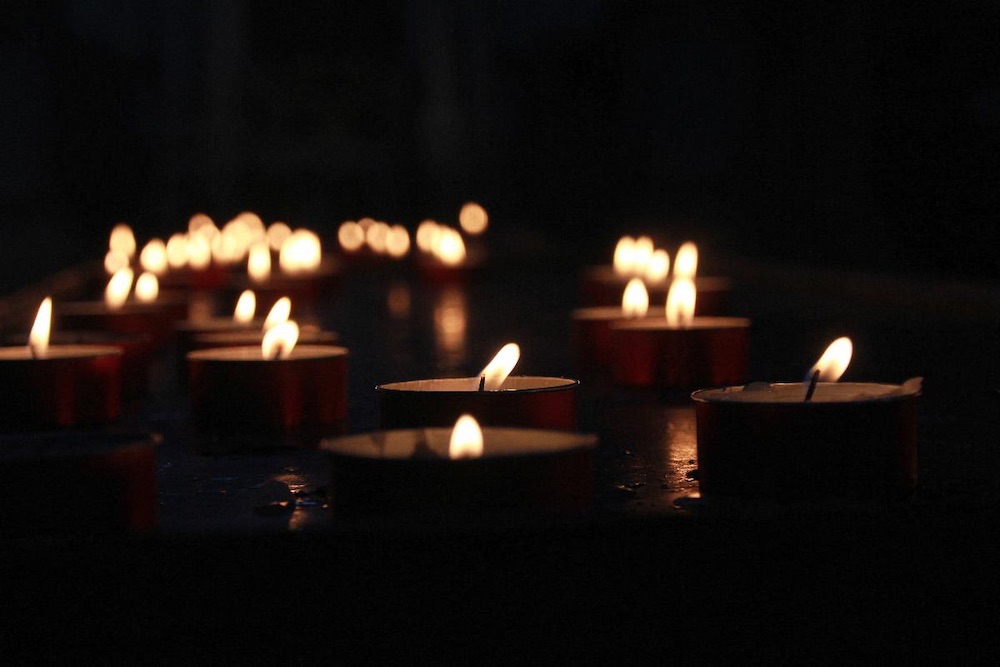“When Jesus arrived (at Bethany), he found that Lazarus
had already been in the tomb four days,” (John 11:17).

In Sunday morning’s Gospel reading from John 11:1-45, Jesus arrives in Bethany a few days after His good friend Lazarus has died. Jesus takes the time to grieve with Mary and Martha (the sisters of Lazarus), but then in dramatic fashion, Jesus shouts into the despair of a dead man’s tomb, “Lazarus, come out!” And Lazarus shuffles out of the grave bound in strips of cloth, like a mummy from those old black and white movies my sisters and I loved to watch when we were kids. “Unbind him and let him go!” Jesus raises Lazarus from death to life.
As I was thinking about this Bible passage, I thought less about the interaction between Jesus and Lazarus (the only time Jesus even speaks to Lazarus is when He shouts, “Lazarus, come out!”), and more about the interaction between Jesus and those who are grieving Lazarus’ death. Jesus spends time with the disciples, Martha, Mary, and many others who are gathered to grieve. He shares words of promise with Martha, “Your brother will live again.” When Jesus sees Mary’s grief, He is greatly disturbed in spirit and deeply moved. In John 11:35, we read that Jesus weeps. When people whom we love die, we mourn, and we grieve.
I still grieve for my four grandparents who played such a prominent role in my young life. I said to my sister a few years back, “I wish Grandma Beaudoin could have seen how all this turned out. My sister simply asked, “What makes you think she doesn’t?” Bless you dear sister. Lazarus had Mary and Martha. I have Deborah and Dana. To grieve is to live and to live is to grieve.
This COVID 19 virus has challenged our confidence, our freedom, and our joy. It has even affected our ability to properly grieve. When I read through the obituaries on page two of our local newspaper, I noted the changes COVID 19 is having on our Life Passages including funerals, memorial services, and burials. “Burial will be private”. “Due to the current circumstances the funeral will be private”. “A memorial service will be held at a later date”. “There will be no visitation or memorial service”. How do you say “goodbye” when you can’t say “goodbye”?
I have received questions from several of our Rostered Ministers and congregational leaders related to care for the dying and conducting funerals. Due to prohibitions on visitation and “physical distancing” (I don’t like the phrase “social distancing”), it is much more difficult to provide pastoral care to a child of God who is dying or to a family that is grieving. I would encourage us all to take the time, and even extra time to reach out to care for these dear ones in ways that are safe (via telephone or video call). I know of a pastor who walked a family member through the Commendation of the Dying over the telephone word for word, and then spent the next 2 hours listening to the family share stories about their husband and father.
We also need to extend the same pastoral care to families and friends who are grieving the death of a loved one. In the current situation, it is simply not safe to perform large public funerals and memorial services. My advice is to speak tenderly and prayerfully with the family to hold a (very small) private burial followed by a public memorial service at a later date.
Wherever I gather to officiate at a graveside service, I always begin with the Invocation (in the name of the Father….) followed by St. Paul’s words from Romans 14:8, “If we live, we live to the Lord, and if we die, we die to the Lord; so then, whether we live or whether we die, we are the Lord’s”. As the disciples, Martha, Mary, and Lazarus discovered… and as we will one day discover… Jesus is the Lord of the dead and the living.
For further guidance related to Funeral Practices during the COVID 19 Crisis, please click on the two links below.
The first is a document published by The Evangelical Lutheran Church in America called, Guidance for Funeral Practices: Ministering to the Bereaved During a Public Health Crisis.
The second is called A Guide for Christian Funerals During COVID 19 published by the Massachusetts Council of Churches. On pages 4-5, please see a Sample Funeral Policy for a parish to adopt during the COVID 19 crisis.